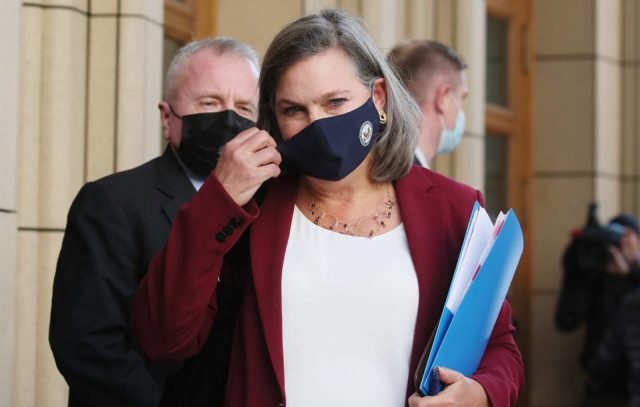
The Kremlin Is Pleased After Kozak-Nuland Talks on Ukraine (Part One)
Publication: Eurasia Daily Monitor Volume: 18 Issue: 159
By:

The Joseph Biden administration has apparently decided to work with Russia toward a political solution to the conflict in Ukraine’s Donbas. On October 13, US Under Secretary of State Victoria Nuland capped a three-day visit in Moscow (see EDM, October 14), conferring with Dmitry Kozak, deputy head of Russia’s presidential administration and special presidential envoy on the conflict in Ukraine’s east. The Biden administration had proactively initiated this visit.
Nuland surprised and delighted Kozak by endorsing the 2015 Minsk “agreement” in its existing form. The endorsement contravenes the Ukrainian government’s and civil society’s view of that document as illegitimate and unacceptable. Kyiv has de facto broken out of that document, without denouncing it officially but calling for its thorough revision, and stonewalling the application of its political clauses.
Nuland also conferred with other Moscow officials on a range of international security issues of concern to the United States, unrelated to Ukraine (see below). The Nuland-Kozak meeting apparently covered Ukraine only. This issue does not top the Biden administration’s order or priorities, but it tops Russia’s. This asymmetry can open the way for tradeoffs, particularly if the Biden administration places itself—as the US-Russian presidential summit in Geneva showed—in the position of soliciting Russia (see EDM, June 17).
Washington has, unusually, not issued a readout of Nuland’s talks in Moscow; nor has it in any way reacted to Moscow’s unprecedentedly satisfied readouts of the talks about Ukraine.
According to Kozak, “Our dialogue was substantive and constructive. We confirmed that the Minsk agreements remain the sole basis for resolving this conflict.” Kozak was pleased that Nuland “confirmed the US position as it was voiced in Geneva [the US-Russian presidential summit, June 16). Namely, any significant progress toward conflict-resolution necessitates an agreement on the future parameters of the autonomy of Donbas in Ukraine—in other words, the special status of Donbas. Given our convergent views on this matter of principle, we have agreed to continue our consultations” (TASS, October 13).
Apart from this official readout, Kozak hinted through his usual leak-outlet (Kommersant, October 13) that he and Nuland “concurred that it would be counterproductive to debate the causes of this conflict and who the parties to this conflict are; and [they concurred] that the Minsk agreements as signed render any such debates moot.”
The Russian Foreign Ministry’s spokesperson, Maria Zakharova, similarly assessed that “the reconfirmation of the Minsk agreements is the main result of the discussions with Nuland about Ukraine… This reconfirmation by the United States is a signal that Kyiv will hopefully hear directly from its overseer (“curator”), Victoria Nuland… There are no impediments for Washington to cooperate [with Russia] in resolving the Ukrainian situation, if Washington wishes to help Ukraine crawl out of the hole in which its politicians have pushed it” (TASS, October 14).
Moscow could not have anticipated an outcome so clearly in its favor. Kremlin spokesperson Dmitry Peskov had, on the eve of the Kozak-Nuland meeting, downplayed its prospects: “we do not rule out this kind of exchange of views, but it certainly does not mean starting a regular Kozak-Nuland format” (TASS, October 12). The meeting’s result, however, has encouraged Kozak to announce the start of just such a format (see above).
Those assessments speak for themselves but still require some elucidation and context. Ukraine insists that the 2015 Minsk “agreement” is unacceptable and must be thoroughly renegotiated; and it sees the “special status” for Donbas as a potential time bomb or cancerous tumor (these comparisons are common in Ukraine). Nuland is familiar with Ukraine’s view since she came up against it during her own stint as negotiator in 2015–2016. President Volodymyr Zelenskyy and his government ultimately adopted the highly critical view prevalent in Ukrainian society about the Minsk “agreements.”
As Kozak points out (see above), Nuland simply repeated the US position as voiced by the two presidents at their Geneva summit (June 16). There, in his own press conference, Russian President Vladimir Putin announced that Biden had in their conversation endorsed the Minsk “agreements,” including a “special status” for Donbas as part of the political settlement. Biden promptly came out in his own press conference to confirm Putin’s announcement. The next day, Nuland similarly called for “political autonomy for Donbas” via Ukrainian media (Radio Svoboda, June 17).
Kozak’s next comment—whether true or not—that he and Nuland agree to not make an issue of the causes of this conflict and who the parties to it are, could reflect a wish to accelerate the negotiations. Suspending these issues or ruling them inadmissible would, however, obscure Russia’s role as the aggressor while preserving the ambiguities in the Minsk “agreements” and the Contact Group over defining who the parties to this conflict are. Ukraine’s efforts to promote clarity on this score would be fatally reversed in that case. To accept that the Minsk “agreements” override those considerations is tantamount to raising Russian-dictated armistice documents above international law, as has been seen in Russia’s protracted conflicts.
“Western kurator [overseer]” (see above) is a ubiquitous invective in Russian propaganda, but Zakharova in this case welcomes the “overseer’s” help to bring Kyiv to heel.



